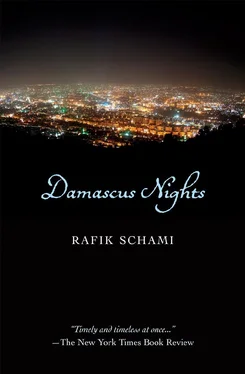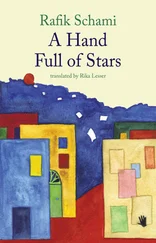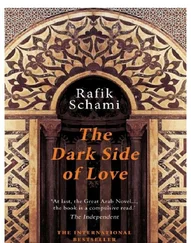He placed some wood in the oven and sat down in front of it on the large chair. The flames danced gaily around the wood. They clung softly to its gnarled skin, as if they wanted to caress it. For a moment the wood stayed hard-hearted and cold. It ignored the flames' seduction, but the fire kept sweetly licking its body and tickling its soul with warm poetry. A few splinters and sharp edges, ignoring the warnings of the trunk, dropped their stubborn opposition and finally caught fire. The wood crackled its displeasure, but soon gave up all resistance and started dancing and singing loudly in one great flame. A short while later both wood and flame melted into a quiet whispering glow at rest on a soft pillow of ashes.
When Salim awoke, it was already noon. He jumped up and lifted the blanket from the birdcage. The goldfinch hopped about and rejoiced in the light, drank from its water glass, and let out a loud trill.
Salim was surprised to realize he had spent the entire night on the chair in front of the stove. And he couldn't remember whether he had
actually recalled his story, or
simply dreamt
it.
13 How one story's magic broke two spells and why seven old men broke into song
October came with splendid colors — so bright that people forgot it was a harbinger of winter. Wearing its alluring dress, the month managed to slink away just in time, so that it was up to November to deliver the unpleasant news to the people of Damascus, and for the next nine days it was rainy and cold. The farmers were overjoyed when the rain began to patter on their fields. But not the Damascenes, who just moaned and groaned about it being dark and wet. But the tenth day of November dawned so sunny and warm it appeared to have escaped from summer.
Every day has its own soul, so people say, and its own personality: good, bad, boring, exciting — just like people. And some days are loners, who eschew the company of conformists and run away. Who can tell what is really going on inside a summery day that decides to leave July and suddenly pop up in the middle of November, completely unannounced?
On this particular day the sun was radiant above the ancient city. The Damascenes — if they weren't inside their shops and offices complaining about having to work on such a day — came out just to behold the sky, or else to sit in their courtyards, drinking coffee and talking about engagements, colds, and broken gutters. In the middle of the afternoon the street burst into life, as the children released all the energy they had kept pent up during the cold weather — which is why a day like this was likely to see many a broken window.
This afternoon was no exception, and a stray ball shattered a windowpane in the home of the post office clerk Khalil. In the heat of the summer that same broken windowpane would have caused Khalil's wife to curse the ancestors of the perpetrator unto the fourth generation, but now all she did was stand up, call her fifteen-year-old son, hand him money for the repair, and urge him to hurry. Then she sat back down beneath the large lemon tree and continued to drink coffee and gossip — without the slightest trace of anger. In fact, she was laughing heartily half an hour later when one of the children gave away the name of the wrongdoer. The boy's mother was also sitting under the lemon tree. Instead of denying her son's guilt, however, or making light of the broken pane, she apologized for his poor manners — something a mother in Damascus rarely does — and the wife of the postal clerk found the sweetest words in reply.
The beautiful weather lasted until late in the afternoon, when clouds gathered to chase the summer day away — apparently they didn't take well to strangers. The summer day struggled desperately as the evening weighed more and more heavily upon the bosom of the city.
Salim and his guests were waiting anxiously for the locksmith. Darkness began to fall, and still no sign of Ali. When the clock tower struck eight, every one in the room felt the air begin to crackle. "Where is that man? Only four hours left until midnight of the last day!" proclaimed the minister. He had no sooner finished his sentence when the locksmith entered the room — together with his corpulent wife, Fatma.
"Good evening," Fatma greeted the men, who had frozen in amazement. Then she nudged the barber in the ribs, and after the bewildered man had made room for her, she sat down beside the old coachman as if seeking his protection.
The old men returned the greeting, as propriety demanded, but annoyance oozed from every pore in their faces. It was the first time in over ten years that a woman had joined their circle.
'"I've never told a story in all my life," the locksmith explained to his dumbfounded friends, "and my friend Salim knows that better than anyone. When I was little I used to love to talk, and I always wanted to tell stories, but my father warned me: 'Hold your tongue, child, or else it will expose you. With every true sentence you speak about yourself, you grow more naked, bit by bit, and so more open to harm.' My mother, God bless her soul, always used to add: 'But remember, child, if the conversation does turn to you, never resort to lies. With every lie you weave, the blanket you are hiding under grows bigger, bit by bit, until it finally suffocates you.' Well, since I didn't want to suffocate or come to any harm I've simply never told anything at all, and I don't think I chose to become a locksmith just by chance. Locksmiths don't talk much. It's always so loud in the shop that you have to shout to be heard, so you only say what you absolutely have to.
"Well, I couldn't sleep the whole night. It would be horrible if I left my good friend Salim in the lurch and he lost his voice forever. But I racked and racked my memory and couldn't find a single story. When my wife found out why I was so upset, she told me that she would gladly tell Salim a story."
"I don't know whether the fairy would agree to that," the minister objected. "Didn't she say the gifts had to come from us, his friends?" he checked with Salim. But the old coachman shook his head in a definitive no. Disappointed, Faris wrinkled his forehead and leaned back.
The barber rolled his eyes, the teacher mumbled something, and the cafe owner looked over at the closed door, as if something there could offer consolation. Only Isam and Tuma the emigrant actually smiled at the woman.
"I came here for Salim's sake — I'm not sitting in your court, Excellency, for you to pass judgment on my visit," said Fatma, annoyed.
The minister sat up straight in his chair. "Tell your woman," he said to Ali, "that she should mind her speech!"
"And this is supposed to be an educated man?" Ali snorted. "I don't care whether you were a minister or a shoeshine boy, don't you go telling me what to say to my wife," he went on loudly.
"You knocked on his door," Tuma the emigrant came to Ali's aid, "and he who knocks must bear his reception."
"If you're so smart," Musa turned on the emigrant, "then tell me, because now I'm knocking on your door: Why is Fatma the only one allowed to take part in our meeting? Why couldn't my wife…"
"Calm down, boy," Isam scoffed at the barber. "Who said she couldn't? Who?"
Now the old men broke into an unholy quarrel. Junis didn't understand why Ali was allowed to bring his wife, either, and he formulated his objection so cleverly that Musa made an even more insulted face. Other old disputes soon resurfaced. Fatma's presence no longer mattered at all; what did matter was why the barber had praised President Nasser as the savior of Syria despite the fact that two nephews of the cafe owner and a teacher who professed a deep and sincere love for the locksmith's grandchildren had been sitting in jail for months without the slightest guilt.
Читать дальше












